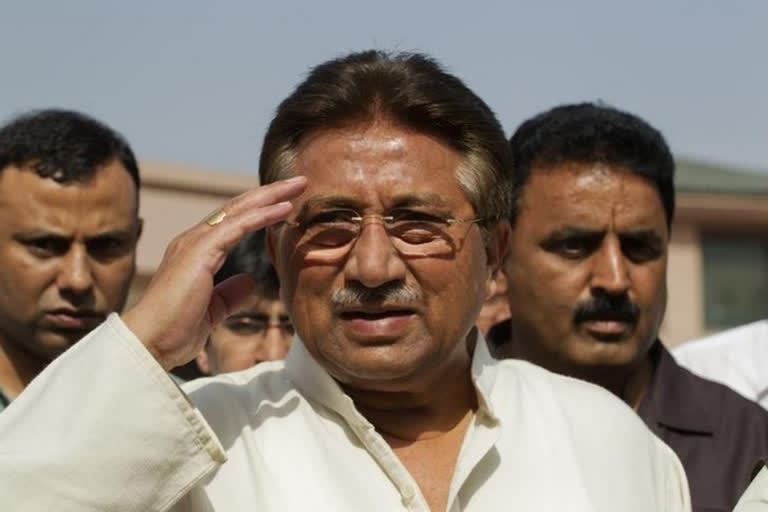Srinagar: Former Pakistan President and chief of Army staff Parvez Musharraf died today at the American Hospital in UAE's Dubai after spending eight years in self-imposed exile. He was 79 years old.
Musharraf's death opened up the reams of memories in Kashmir as it was during his rule that India and Pakistan initiated a dialogue process for resolution of Kashmir conflict. His eight year rule of Pakistan will be remembered in Kashmir history and politics for ever as he was considered architect of four point formula that saw India and Pakistan almost settling Kashmir before he was ousted in 2008.
As an army general of Pakistan he led the Kargil war against India in 1999, yet during his regime India and Pakistan had close ties that have always been dependant on Kashmir. Musharraf seized power through coup against then prime minister Nawaz Sharif in 1999 and remained in power till 2008 August when he was forced to quit.
The scars of the war in Kargil were fresh, yet India and Pakistan entered into a dialogue process which began in July 2001 when president Musharraf visited Agra for a peace summit with Prime Minister Atal Bihari Vajpayee. The deal failed and both counties blamed each other other for failing the summit. The dialogue process got stalled as BJP led NDA lost the 2004 general elections in India and Congress led UPA was elected to power in India. The process resumed after Musharraf met Prime Minister Manmohan Singh in 2005 in New York on the sidelines of a UN summit.
In 2006, Musharraf envisaged four point formula which laid emphasis on demilitarization, self-governance, free movement across Line of Control for the divided Jammu and Kashmir and a joint mechanism between India and Pakistan for the implementation of the formula. The four point formula was an every day talk in Kashmir- both in mainstream and separatists camps. Mainstream leaders- Omar Abdullah, Mehbooba Mufti, M Y Tarigami and others would always welcome the formula, the separatist amalgam, Hurriyat Conference formed in July 1993, saw a vertical divide.
Late Syed Ali Geelani who was called a hardliner would oppose the four point formula, but Mirwaiz Umar Farooq and other separatists supported it.
This opposing stand led a split of Hurriyat Conference that was never to bridge. The division was accelerated by other factors also whose seems were sown earlier.
Also read: Chennai: Famous playback singer Vani Jayaram found dead at home
Geelani’s firm opposition to Musharraf's formula saw him sidelined by Musharraf government, but it acted as fuel to his prominence in Kashmir till his death and the same period saw him overshadowing Mirwaiz led moderate camp. Geelani desired merger of Kashmir with Pakistan while Mirwiaz Umar Farooq always supported any dialogue process.
Musharraf sidelined Geelani after he opposed his formula for resolution while the moderates held several rounds of talks with New Delhi government for which the dye was cast during Vajpayee led NDA government. The moderates visited Pakistan were allowed to travel to Pakistan by Manmohan Singh led government, where they met Musharraf in 2004.
In Islamabad (Pakistan) Mirwaiz Umar was asked about Geelani's opposition to four point formula, he had replied "it was not a time to pursue personal politics." Geelani's acrimony to four point formula was so much so that when Musharraf was ousted from his office in 2008, he declared it a good news for people of Kashmir to a rousing gathering in Srinagar's Tourist Reception Ground.
During Musharraf's regime mainstream leaders including former chief ministers Omar Abdullah, Mehbooba, M Y Tarigami and other leaders visited Pakistan for Pugwash Conference in March 2006 and were welcomed by Musharraf. This visit was recognition of mainstream politicians by Pakistan who had always termed them quislings of India.
These visits of separatists and mainstream leaders to Pakistan were meant to smoothen the ground for the four point formula and resolution of Kashmir conflict. Following ouster of Musharraf, ties between India and Pakistan and four point formula process froze. After 2014 relations between India and Pakistan worsened when BJP came to power with majority and since then there is no sign of thaw.
With Musharraf lying in grave, it seems his four point formula on Kashmir also got buried with him given the firm stand on BJP government which says that after the abrogation of Article 370 and downgrading of Jammu and Kashmir into Union Territory, it has resolved Kashmir once and for all.
However, political experts on south Asia and politicians like Mehbooba Mufti still expect Musharraf’s formula are still workable. Mehbooba said he was the perhaps the only Pakistani General who genuinely tried to address the Kashmir issue.
“He wanted a solution according to wishes of people of J&K & acceptable to India & Pak. Though GOI has reversed all CBMs initiated by him & Vajpayee ji, the ceasefire remains." Pravin Sawhney, a leading defence expert in India, wrote in April last year that former Pakistan army chief General Qamar Javed Bajwa seemed to resume talks on Kashmir under Musharraf’s ‘four-point formula.



